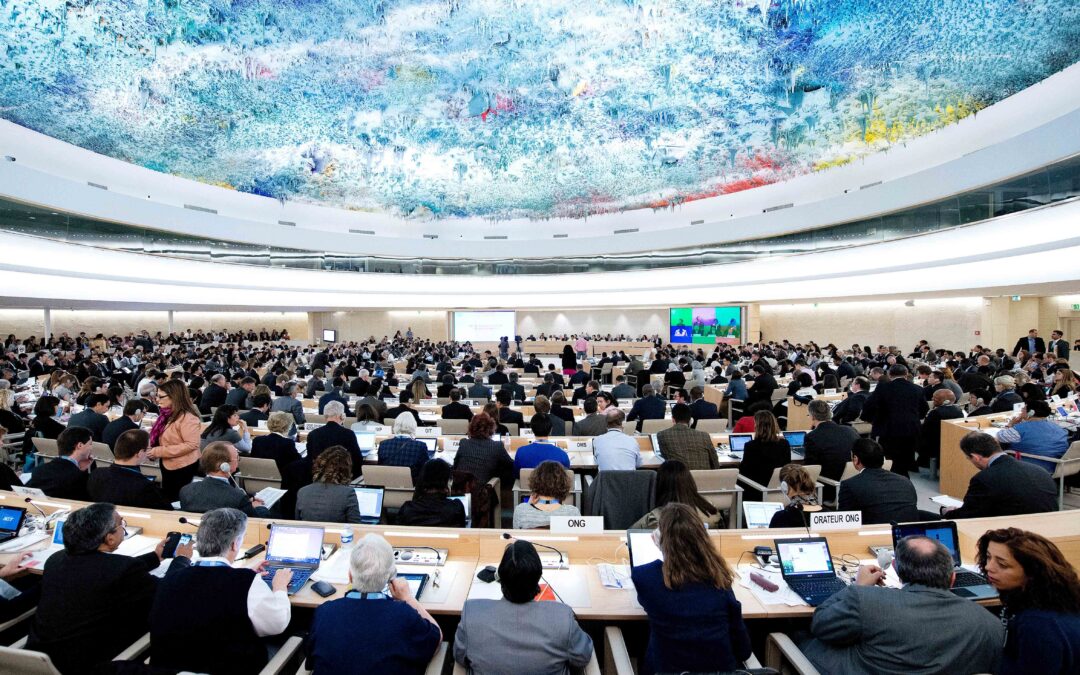
Sep 17, 2018 | Advocacy, Non-legal submissions
Today at the UN Human Rights Council, the ICJ emphasised the importance of effective investigations capable of leading to truth and justice, highlighting recent developments in Manipur, India as an example.
The statement read as follows:
“Justice processes in situations of conflict or transition require fighting impunity and re-establishing public trust.[1] An example is the new prospects for justice in relation to 1528 alleged extrajudicial killings cases in Manipur, India, which would make an important contribution to a transition out of the long-standing conflict.
In July 2016, in response to a petition filed on behalf of the victims, the Indian Supreme Court stated that “there is no concept of absolute immunity from trial…”,[2] opening the door to ending impunity. As of August 2018, the Central Bureau of Investigation has registered 29 complaints against security forces.[3] Recent reports suggest that the Government is also considering amending the Armed Forces Special Powers Act (AFSPA) to remove or restrict existing overbroad authorizations for use of lethal force.[4]
These are welcome developments. However, concerns remain, as the investigation status of the majority of the cases is unknown. Two UN Special Rapporteurs in July 2018 also affirmed that justice must be done in all cases.[5]
The ICJ calls on India to ensure independent, impartial and thorough investigations into all cases in Manipur, amend AFSPA, and to uphold the right to truth of victims and society about acts committed and the identity of perpetrators, in line with its international and national legal obligations, including as a party to the International Covenant on Civil and Political Rights.”
[1] Report of the Special Rapporteur on the promotion of truth, justice, reparation and guarantees of non-recurrence, A/HRC/39/53 (25 July, 2018), http://www.undocs.org/A/HRC/39/53.
[2] Para 163, Extra Judicial Execution Victim Families Association (EEVFAM) & Anr. v. Union of India & Anr. Writ Petition (Criminal) No. 129/2012.
[3] TNN, “Army Major named in FIR for killing 12-yr-old in fake Manipur encounter”, Times of India, August 3, 2018, https://timesofindia.indiatimes.com/city/imphal/army-major-named-in-fir-for-killing-12-yr-old-in-fake-manipur-encounter/articleshow/65252258.cms.
[4] “In AFSPA, Government Considering Crucial Changes”, NDTV, September 13, 2018, available at https://www.ndtv.com/india-news/in-afspa-government-considering-crucial-change-sources-1915706.
[5] Special Rapporteur on extrajudicial, summary or arbitrary executions and Special Rapporteur on the situation of human rights defenders, “India: UN experts call for urgent progress in investigation of hundreds of ‘fake encounter’ killings” (4 July 2018), https://www.ohchr.org/en/NewsEvents/Pages/DisplayNews.aspx?NewsID=23323&LangID=E .
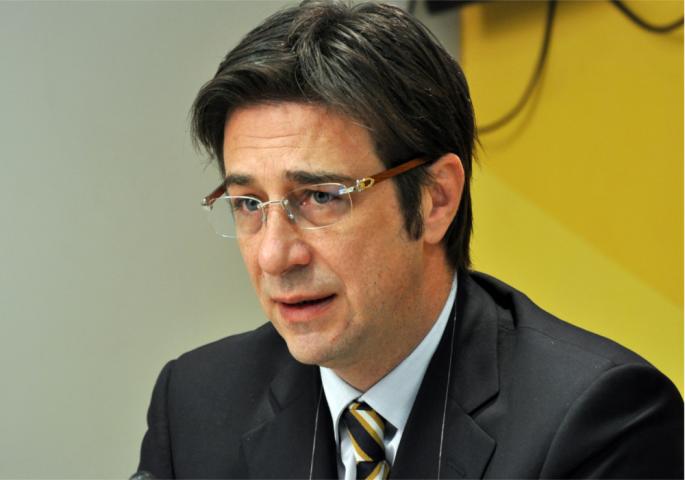
Jul 30, 2018 | News
The killing of Serbian defense lawyer Dragoslav Ognjanović must be independently, promptly, and thoroughly investigated and the perpetrators brought to justice, the ICJ said today.
Dragoslav Ognjanović (photo), a prominent lawyer who had defended Slobodan Milosovic and had also represented defendants in cases of organized crime, was shot dead outside his home in Belgrade late on Saturday 28 July.
“Safety of lawyers is essential to the fair operation of the justice system and to protection of the rule of law. The Serbian authorities now need to take urgent steps to re-establish confidence that they can ensure the safety of lawyers who may be under threat, and to investigate and bring to justice the perpetrators of this crime,” said Justice Radmila Dragicevic-Dicic, of Serbia’s Supreme Court, Vice-President of the ICJ.
“Investigation and prosecution of this case will be a significant test for the Serbian authorities and the legal system,” she added.
The Serbian and Belgrade bar associations have called a week-long suspension of work by lawyers in order to express their concern at the risk of violence against lawyers.
Serbian authorities have blamed an ongoing turf war between organized crime groups competing to control the narcotics trade.
“The concerns of the Serbian legal profession should be taken seriously by the government and the prosecution service, and the bar associations should be consulted on means to ensure the safety of lawyers,” said Róisín Pillay, Director of ICJ’s Europe Programme.
Additional information
International human rights law, including the European Convention on Human Rights to which Serbia is a party, requires that states take steps to protect the life and physical integrity of persons who they know or ought to know are at real risk of violence.
In addition, the right to life, protected under Article 2 of the European Convention as well as under other international law standards, requires states to ensure an independent, prompt and effective investigation into killings, with a view to bringing to justice those responsible.
According to the UN Basic Principles on the Role of Lawyers, governments must ensure that lawyers are able to perform all of their professional functions without intimidation, hindrance, harassment or improper interference (principle 16). The UN Basic Principles specify that “[w]here the security of lawyers is threatened as a result of discharging their functions, they shall be adequately safeguarded by the authorities” (principle 17).
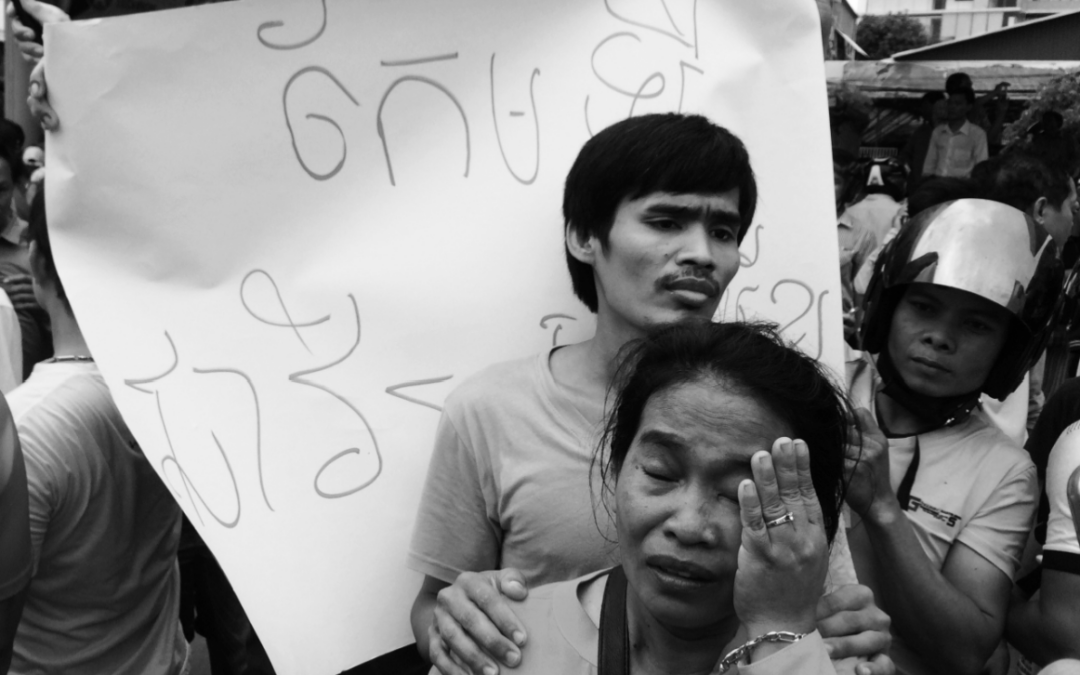
Jul 9, 2018 | News
Today, in advance of the second anniversary of the killing of political commentator and human rights defender, Kem Ley, the ICJ reiterates its call for the creation of a independent and impartial Commission of Inquiry to investigate his killing.
The ICJ remains deeply concerned at the apparent lack of progress in investigating the case, as well as the inadequacy of the investigation and prosecution of Oeuth Ang, the only person yet charged or convicted in relation to Kem Ley’s killing.
“The trial of Oeuth Ang left many unanswered questions about the investigation and the killing itself which Cambodia has an duty to resolve as part of the family and public’s right to know the truth,” said Kingsley Abbott, Senior Legal Adviser at the ICJ, who attended the trial.
“The fact that the killing occurred against the backdrop of escalating attacks against human rights defenders and the political opposition and in the context of a history of well-documented apparent extra-judicial killings makes the establishment of an independent and impartial Commission of Inquiry all the more pressing.”
On 7 July 2017, ahead of the one-year anniversary of Kem Ley’s killing, the ICJ and other organizations released a joint letter highlighting crucial concerns about the lack of progress in the investigation of his case, and calling on the Cambodian Government to establish a Commission of Inquiry to carry out an independent, impartial, effective and transparent investigation in line with international law and standards.
These include the International Covenant on Civil and Political Rights and the revised Minnesota Protocol on the Investigation of Potentially Unlawful Death (2016).
Background
At approximately 08:30 on 10 July 2016, Kem Ley, a prominent political commentator and human rights defender, was shot and killed at a petrol station on Monivong Boulevard in Phnom Penh.
Soon afterwards, Cambodian police arrested a suspect approximately two kilometers from the crime scene. The suspect identified himself as “Chuob Samlab”, from Banteay Meanchey province. “Chuob Samlab” means “Meet to Kill” in Khmer.
In a leaked video, “Chuob Samlab” reportedly “confessed” to shooting Kem Ley over a debt the political commentator allegedly owed him – a fact reportedly disputed by Kem Ley’s widow and “Chuob Samlab”’s own wife.
“Chuob Samlab” was later identified as Oeuth Ang from Siam Reap province, according to identity records.
On 23 March 2017, the Phnom Penh Municipal Court found Oeuth Ang guilty of the premeditated murder of Kem Ley on 10 July 2016 and sentenced him to life imprisonment.
The ICJ observed the trial which took place on 1 March 2017, following which it identified eight significant gaps in the investigation which had not been adequately addressed at trial.
Following the verdict, Oeuth Ang’s lawyer told journalists the court had created a new case-file to investigate two men named Pou Lis and Chak who may be relevant to the killing of Kem Ley.
Very little information has been revealed publicly about these possible new case-files.
Oeuth Ang appealed his sentence and, on 4 May 2018, the Court of Appeal reportedly heard the appeal.
There are no reports yet of a judgment being delivered.
Pursuant to international law binding on Cambodia, including the International Covenant on Civil and Political Rights (ICCPR) to which Cambodia is a State Party, Cambodia has a duty to promptly, independently, impartially, and effectively investigate all deaths suspected of being unlawful.
Investigations must seek to identify not only direct perpetrators but also all others who may have been responsible for criminal conduct in connection with the death.
Principle 11 of the UN Principles on the Effective Prevention and Investigation of Extralegal, Arbitrary and Summary Executions calls for the establishment of a Commission of Inquiry when ‘the established investigative procedures are inadequate because of lack of expertise or impartiality, because of the importance of the matter or because of the apparent existence of a pattern of abuse, and in cases where there are complaints from the family of the victim about these inadequacies.’
Read also
ICJ et al, ‘Cambodia: request to create a commission of inquiry into the killing of Kem Ley’
ICJ, HRW, Amnesty International, ‘Cambodia: Significant Questions Remain After Guilty Verdict in Kem Ley Trial’
ICJ, ‘Cambodia: Kem Ley’s killing demands immediate credible and impartial investigation’
Contact
Kingsley Abbott, ICJ Senior Legal Adviser, e: kingsley.abbott(a)icj.org
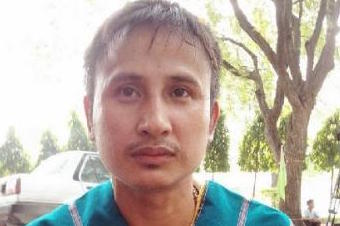
Jul 2, 2018 | News
Today, the ICJ, along with Amnesty International and Human Rights Watch, made a join statement about the special investigation of the apparent enforced disappearance of Karen activist, Pholachi “Billy” Rakchongcharoen.
The investigation of the apparent enforced disappearance of Karen activist, Pholachi “Billy” Rakchongcharoen, should genuinely seek to establish Billy’s fate and whereabouts, continually and fully inform his family on developments.
The investigation should also bring persons identified as responsible, irrespective of rank or status, to justice in a fair trial, the International Commission of Jurists (ICJ), Amnesty International and Human Rights Watch said today.
The organizations also called on authorities to expedite long overdue legal and administrative measures to provide better protection against enforced disappearance, in compliance with Thailand’s international human rights obligations.
On 28 June 2018, following a meeting of the Special Case Committee No. 1/2018, the Ministry of Justice’s Department of Special Investigations (“DSI”) made the welcome announcement that it had decided to recognize the apparent enforced disappearance of Pholachi “Billy” Rakchongcharoen an ethnic Karen activist, as a “Special Case” that must be “investigated in accordance with the Special Case Investigation Act, B.E. 2547 (2004)”, that is, by the DSI itself.
Pholachi “Billy” Rakchongcharoen was last seen on 17 April 2014 in the custody of Kaeng Krachan National Park officials in Thailand’s Phetchaburi province.
At the time of his apparent enforced disappearance, Billy had been working with ethnic Karen villagers and activists on legal complaints against the National Park officials for purportedly burning and destroying their houses, farms, and other properties.
The DSI’s announcement followed a long-standing request by Billy’s wife, Phinnapha Phrueksaphan, and years of advocacy by the ICJ, Amnesty International and Human Rights Watch calling on the DSI to assume jurisdiction over the case.
They are also calling the DSI to conduct a prompt, independent, impartial and effective investigation into his fate or whereabouts consistent with international law and standards, including the revised Minnesota Protocol on the Investigation of Potentially Unlawful Death (2016), which was launched in collaboration with the Thai Ministry of Justice on 25 May 2017.
The revised Minnesota Protocol states that if investigators are unable to locate a body or remains, they should continue to gather other direct and circumstantial evidence which may suffice for identifying the perpetrator(s).
Despite the existence of a wealth of information relevant to the circumstances surrounding Billy’s apparent enforced disappearance, the four-year-old police investigation has been marked by a significant lack of progress.
At the same time, Thailand has yet to honor its repeated commitments to ratify the International Convention for the Protection of All Persons from Enforced Disappearance (ICPPED), which it signed on 9 January 2012.
Thai authorities have failed to implement Thailand’s international legal obligations to provide justice for the victims of enforced disappearance and their families. Perpetrators are able to evade penalties, at least in part because Thai laws still do not make enforced disappearance a specific criminal offence.
The Convention affirms that “no one shall be subjected to enforced disappearance” and places an obligation on states to investigate acts of enforced disappearance, to bring those responsible to justice, and make it a criminal offence punishable by appropriate penalties that take into account its “extreme seriousness”.
On 10 March 2017, Thailand’s legislative body, the National Legislative Assembly (NLA), voted in favor of ratifying the ICPPED. However, on 6 September 2017, the ICJ was informed by Thailand’s Ministry of Foreign Affairs that a decision had been taken to delay the ratification of the ICPPED until legislation had been enacted to give domestic effect to the treaty.
Irrespective of ICPPED ratification, Thailand is also obliged to effectively investigate and prosecute the crime of enforced disappearance under the International Covenant on Civil and Political Rights (ICCPR) and the UN Convention against Torture (CAT).
Efforts to pass a law making torture, other acts of ill-treatment and enforced disappearance specific offences in Thai law have also stalled.
Thailand’s Ministry of Justice notes that a second round of public consultations on a Draft Prevention and Suppression of Torture and Enforced Disappearance Act (‘Draft Act’) has been concluded and that it is now in the process of evaluating the consultations.
The ICJ, Amnesty International and Human Rights Watch urge that this process be hastened.
The ICJ, Amnesty International and Human Rights Watch have reviewed several versions of the Draft Act and are seriously concerned that adoption of the Draft Act as it currently stands will fail to bring the law into compliance with Thailand’s international human rights obligations.
On 30 August 2017, 23 November 2017, and 12 March 2018, civil society organizations, including the ICJ, Amnesty International and Human Rights Watch, sent open letters to the Government, including to Thailand’s Minister of Justice, outlining amendments that would be necessary to bring the Draft Act in line with Thailand’s international human rights obligations.
Contact
Kingsley Abbott, Senior Legal Adviser, ICJ Asia Pacific Programme, t: +66 94 470 1345, e: kingley.abbott(a)icj.org
Full statement in English (PDF): Thailand-Special-investigation-Billy-News-Press-releases-June-2018-ENG
Full statement in Thai (PDF): Thailand-Special-investigation-Billy-News-Press-releases-June-2018-THA
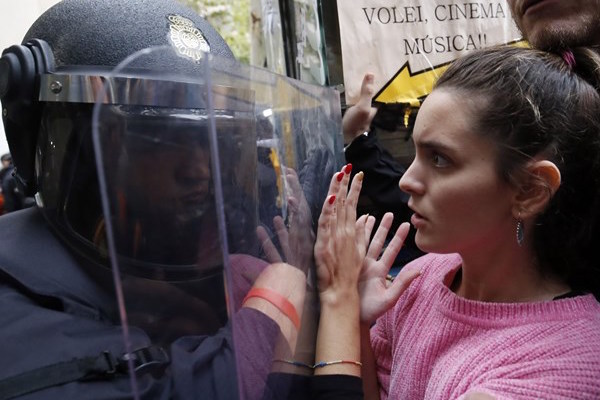
Oct 2, 2017 | News
The ICJ today expressed concern at the apparently unlawful violence surrounding yesterday’s referendum in Catalonia, as Catalan authorities sought to hold a vote on the independence of the region. The Spanish Constitutional Court had ruled that the referendum was illegal.
The ICJ calls on all parties concerned to resolve the current crisis in accordance with international human rights law and in the framework of the rule of law.
The ICJ is particularly concerned at allegations of excessive use of force during police operations aimed at enforcing court orders to prevent the referendum being held.
International human rights obligations binding on Spain require that any use of force by agents of the State must be no more than is strictly necessary in the circumstances to meet a grave threat .
All aspects of police operations, including their planning and co-ordination, and the training, guidance and orders given to police officers on the ground, must be designed to minimize the use of physical force.
The ICJ calls for a thorough, prompt and independent investigation into the violence surrounding the referendum, and for those responsible for acts of violence in violation of human rights to be brought to justice.
Background
Spain has obligations to respect the right to life and the right to physical integrity of any person under its jurisdiction under articles 6 and 7 of the International Covenant on Civil and Political Rights, and articles 2, 3 and 8 of the European Convention on Human Rights.
Standards in this regard are re-enforced by the UN Code of Conduct for Law Enforcement Officials and the UN Basic Principles on the Use of Force and Firearms by Law Enforcement Officials.
Positive obligations under these provisions require that allegations of lethal or potentially lethal force, or force that could amount to cruel inhuman or degrading treatment or torture, be the subject of investigation that is independent and impartial, thorough and prompt.
The violence surrounding the referendum on Catalonia’s independence reportedly resulted in injuries to at least 844 civilians and 33 police offices.
Contacts:
Róisín Pillay, ICJ Europe Programme Director, t: +32 2 734 84 46 ; e: roisin.pillay(a)icj.org
Massimo Frigo, ICJ Senior Legal Adviser, t: +41 22 979 3805 ; e: massimo.frigo(a)icj.org









